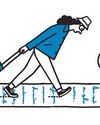
In January, the computer scientist Geoffrey Hinton gave a lecture to Are We Doomed?, a course at the University of Chicago. He spoke via Zoom about whether artificial intelligence poses an existential threat. He was cheerful and expansive and apparently certain that everything was going to go terribly wrong, and soon. “I timed my life perfectly,” Hinton, who is seventy-six, told the class. “I was born just after the end of the Second World War. I was a teen-ager before there was AIDS. And now I’m going to die before the end.”
Most of the several dozen students had not been alive for even a day of the twentieth century; they laughed. In advance of Hinton’s talk, they had read about how A.I. could simplify the engineering of synthetic bioweapons and concentrate surveillance power into the hands of the few, and how a rogue A.I. could relentlessly pursue its goals regardless of the intentions of its makers—the whole grim caboodle. Hinton—who was a leader in the development of machine learning and who, since resigning from Google, last year, has become a public authority on A.I. threats—was asked about the efficacy of safeguards on A.I. “My advice is to be seventy-six,” he said. More laughter. A student followed up with a question about what careers he saw being eliminated by A.I. “It’s the first time I’ve seen anything that makes it good to be old,” he replied. He recommended becoming a plumber. “We all think what’s special about us is our intelligence, but it might be the sort of physiology of our bodies . . . is what’s, in the end, the last thing that’s better,” he said.
This story is from the June 10, 2024 edition of The New Yorker.
Start your 7-day Magzter GOLD free trial to access thousands of curated premium stories, and 9,000+ magazines and newspapers.
Already a subscriber ? Sign In
This story is from the June 10, 2024 edition of The New Yorker.
Start your 7-day Magzter GOLD free trial to access thousands of curated premium stories, and 9,000+ magazines and newspapers.
Already a subscriber? Sign In

OCCUPY PARADISE
How radical was John Milton?

CHAOS THEORY
What professional organizers know about our lives.

UP FROM URKEL
\"Family Matters\" and Jaleel White's legacy.

OUTSIDE MAN
How Brady Corbet turned artistic frustration into an American epic.

STIRRING STUFF
A secret history of risotto.

NOTE TO SELVES
The Sonoran Desert, which covers much of the southwestern United States, is a vast expanse of arid earth where cartoonish entities-roadrunners, tumbleweeds, telephone-pole-tall succulents make occasional appearances.

HEAD CASE
Paul Valéry's ascetic modernism.

LOVE FOR SALE
When America tried to get on top of the sex trade.

NO ROOM FOR A MASTERPIECE
Rashid Johnson's art of masculine vulnerability is going to the Guggenheim.

BOOK A STRESS-FREE GETAWAY
Recently refurbished houseboat. Sleeps four guests comfortably, and many more less comfortably, but it's definitely doable and safe, though no jumping all at once, please.